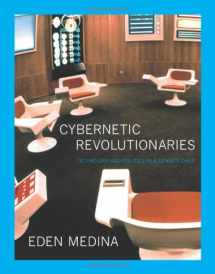
Cybernetic Revolutionaries: Technology and Politics in Allende's Chile
Book details
Summary
Description
In Cybernetic Revolutionaries, Eden Medina tells the history of two intersecting utopian visions, one political and one technological. The first was Chile's experiment with peaceful socialist change under Salvador Allende; the second was the simultaneous attempt to build a computer system that would manage Chile's economy. Neither vision was fully realized -- Allende's government ended with a violent military coup; the system, known as Project Cybersyn, was never completely implemented -- but they hold lessons for today about the relationship between technology and politics.
Drawing on extensive archival material and interviews, Medina examines the cybernetic system envisioned by the Chilean government -- which was to feature holistic system design, decentralized management, human-computer interaction, a national telex network, near real-time control of the growing industrial sector, and modeling the behavior of dynamic systems. She also describes, and documents with photographs, the network's Star Trek-like operations room, which featured swivel chairs with armrest control panels, a wall of screens displaying data, and flashing red lights to indicate economic emergencies.
Studying project Cybersyn today helps us understand not only the technological ambitions of a government in the midst of political change but also the limitations of the Chilean revolution. This history further shows how human attempts to combine the political and the technological with the goal of creating a more just society can open new technological, intellectual, and political possibilities. Technologies, Medina writes, are historical texts; when we read them we are reading history.


We would LOVE it if you could help us and other readers by reviewing the book
Book review



